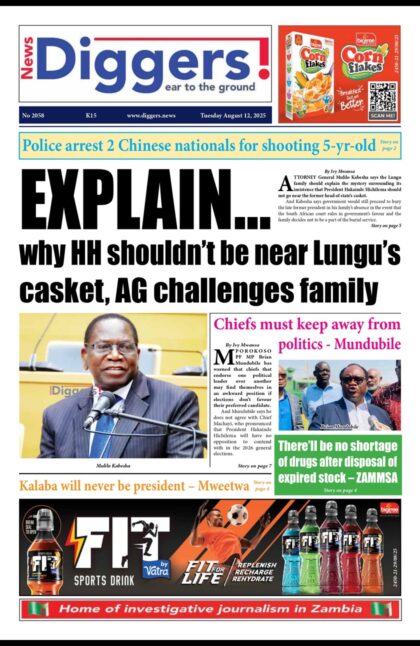Veteran politician Vernon Mwaanga says 2019 has been a depressing and disappointing year for most Zambians due to the negative economic situation and poor governance the country has experienced.
And Mwaanga has urged the ruling PF government to start treating opposition political parties with more respect and dignity because they will not be in power forever.
In a statement, Mwaanga, the seasoned diplomat who also served as minister in various portfolios, pointed out that Zambia’s low Gross Domestic Product, high food prices, inability to come up with constitutional amendments, load shedding, among others, had mainly contributed to overburdening of Zambians this year.
“We are just about to bid farewell to 2019 and welcome the New Year of 2020 in rather gloomy circumstances. The year 2019 has been very disappointing and frustrating in many respects, nationally and globally, because there have been so many retrogressive things, which have negatively impacted lives of our overburdened citizens. These include the following: negative GDP economic growth, high food prices, which show no signs of retreating anytime soon; inability to come up with constitutional amendments – and not Bill 10- which genuinely represents the free will of the people of Zambia, due to lack of a genuinely transparent consultative process with stakeholders,” Mwaanga stated.
“Inability of the government to declare hunger an emergency due to drought caused by poor rainfall, not just in Zambia, but in the SADC region as a whole. Countries, which have declared hunger emergencies, are receiving international support to mitigate hunger; excessive load shedding, which has caused serious havoc to small, medium and large enterprises in the whole country.”
He pointed out that the absence of any meaningful dialogue of political parties and the misinterpretations of the Public Order Act had also frustrated the democratic dispensation in 2019.
“Total absence of any meaningful dialogue, among our political leaders, to seriously discuss issues like falling standards of education in our country; the economy; political violence involving sponsored unruly party cadres, particularly during general elections and by-elections, which prevents citizens from exercising their democratic right to freely vote for representatives of their choice because, consequently, it lowers voter turnout. Shrinking space for opposition political parties and civil society organizations to freely carry out their legitimate activities like holding card renewals, public meetings, demonstrations, all of which are constitutionally permitted,” Mwaanga added
“Misinterpretations of the Public Order Act, as amended in 1996 after the Supreme Court of Zambia ruled some of its provisions archaic and inconsistent with specific provisions of the Constitution of Zambia and the Bill of Rights, which give citizens the freedom to make political choices as well as to assemble. Parliament removed the need for permits to be applied for from the Zambia Police Service and stipulated that the police should merely be ‘notified.’ The new law outlines specific and unambiguous procedures to be followed by both those notifying the police and the police themselves. I have heard senior officers, times without number, use the word ‘permit’ in 2019. Where are Zambia Police getting the word ‘permit’ from? Because the Supreme Court of Zambia removed it from the Public Order Act in 1996! The rising levels of political intolerance, particularly between and among political parties, which in-turn pollutes the political environment in our country.”
He stated that the failure to sanction former ministers, who illegally stayed in office after Parliament was dissolved in 2016 even after the Constitutional Court ruled on the matter, showed that the law was being undermined.
“Breakdown of the rule of law and disregard of court judgements, as can be seen by the stubborn refusal of government ministers, who overstayed in office after Parliament, was dissolved in 2016. The Constitution of Zambia clearly states that ministers shall be appointed from among members of parliament. It, therefore, goes without saying that when Parliament is dissolved, there can’t be ministers. This has been the case for many years. The fact that no sanctions have been taken against them for failing to obey a decision of the Constitutional Court, whose judgement is not supposed to be appealed, only goes to show that we have two sets of laws in our country: one law for leaders and another for ordinary citizens, contrary to the Constitution, which clearly stipulates that no one is above the law,” Mwaanga stated.
And Mwaanga advised the ruling PF to treat opposition opponents the same way that they will want to be treated when they leave power as public office was never permanent.
“What is wrong with our world and what is particularly wrong with us Zambians? Why have we become so inhuman and intolerant towards one another? Where has the spirit of love, respect and reconciliation retreated to? Where has the motto of ‘one Zambia, one nation’ gone to? Why don’t we learn from the Kenyan spirit of genuine political reconciliation, accommodation and brotherhood? I know that power corrupts and absolute power corrupts absolutely. I have spent nearly six decades of my life in public service and I know that political arrogance does not pay because power is never permanent,” stated Mwaanga.
“Those currently in power should treat their opponents as they would want to be treated when they are out of power. They should never forget the lessons of history that what goes round comes round. History has a cruel way of repeating itself. I hope that as we prepare for the New Year of 2020, our political leaders will in all honesty, embrace each other and treat each other as brothers and sisters and stop treating each other as enemies. Hate speeches and hate politics should become a thing of the past in 2020. All those who write and make hate speeches must be arrested and severely punished! They degrade our society and dehumanise us as a people.”
























